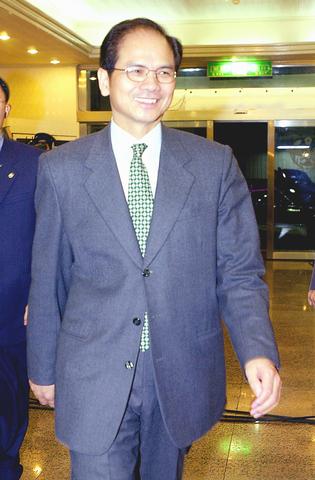Premier-designate Yu Shyi-kun spent his last weekend before taking office dining with Cabinet members yesterday and discussing the details of a joint pledge in which team spirit, efficiency and frugality will be emphasized.
In addition, a crash course for incoming Cabinet members has been scheduled for Thursday. Old and new members have been invited to participate in the program, in which government officials will familiarize themselves with their jobs and learn how to deal with lawmakers and the media.

PHOTO: GEORGE TSORNG, TAIPEI TIMES
Yu ate lunch and dinner yesterday with two groups of newly appointed Cabinet members at the Armed Forces Officer's Club.
Chuang Suo-hang (
"It's a warm-up for the big day," Chuang said.
The incoming Cabinet members also exchanged views on the joint pledge, an idea brought up by Yu, Chuang said.
"The purpose of the joint pledge is to commit oneself to do the utmost to continue political reforms, increase administrative efficiency and practice frugality," Chuang quoted Yu as saying.
Chuang also said that the pledge was designed to show the public that the new Cabinet is determined to accomplish the goals and work as a team for the best interests of the nation.
"The premier emphasized that each and every `combative Cabinet' member should work as a team and do their best to accomplish the missions," Chuang said.
In explaining the definition of a "combative Cabinet," Chuang quoted Yu as saying that the term means the new Cabinet will face challenges courageously and take the initiative to identify problems and solve them without hesitation.
Yu appointed the 39 members of the "combative Cabinet" between Jan. 21 and Jan. 24. Eight of them are women and 16 are holdovers from the previous Cabinet. The average age of the new Cabinet members is 53 years old.

A Ministry of Foreign Affairs official yesterday said that a delegation that visited China for an APEC meeting did not receive any kind of treatment that downgraded Taiwan’s sovereignty. Department of International Organizations Director-General Jonathan Sun (孫儉元) said that he and a group of ministry officials visited Shenzhen, China, to attend the APEC Informal Senior Officials’ Meeting last month. The trip went “smoothly and safely” for all Taiwanese delegates, as the Chinese side arranged the trip in accordance with long-standing practices, Sun said at the ministry’s weekly briefing. The Taiwanese group did not encounter any political suppression, he said. Sun made the remarks when

The Taiwanese passport ranked 33rd in a global listing of passports by convenience this month, rising three places from last month’s ranking, but matching its position in January last year. The Henley Passport Index, an international ranking of passports by the number of designations its holder can travel to without a visa, showed that the Taiwan passport enables holders to travel to 139 countries and territories without a visa. Singapore’s passport was ranked the most powerful with visa-free access to 192 destinations out of 227, according to the index published on Tuesday by UK-based migration investment consultancy firm Henley and Partners. Japan’s and

BROAD AGREEMENT: The two are nearing a trade deal to reduce Taiwan’s tariff to 15% and a commitment for TSMC to build five more fabs, a ‘New York Times’ report said Taiwan and the US have reached a broad consensus on a trade deal, the Executive Yuan’s Office of Trade Negotiations said yesterday, after a report said that Washington is set to reduce Taiwan’s tariff rate to 15 percent. The New York Times on Monday reported that the two nations are nearing a trade deal to reduce Taiwan’s tariff rate to 15 percent and commit Taiwan Semiconductor Manufacturing Co (TSMC, 台積電) to building at least five more facilities in the US. “The agreement, which has been under negotiation for months, is being legally scrubbed and could be announced this month,” the paper said,

MIXED SOURCING: While Taiwan is expanding domestic production, it also sources munitions overseas, as some, like M855 rounds, are cheaper than locally made ones Taiwan and the US plan to jointly produce 155mm artillery shells, as the munition is in high demand due to the Ukraine-Russia war and should be useful in Taiwan’s self-defense, Armaments Bureau Director-General Lieutenant General Lin Wen-hsiang (林文祥) told lawmakers in Taipei yesterday. Lin was responding to questions about Taiwan’s partnership with allies in producing munitions at a meeting of the legislature’s Foreign Affairs and National Defense Committee. Given the intense demand for 155mm artillery shells in Ukraine’s defense against the Russian invasion, and in light of Taiwan’s own defensive needs, Taipei and Washington plan to jointly produce 155mm shells, said Lin,